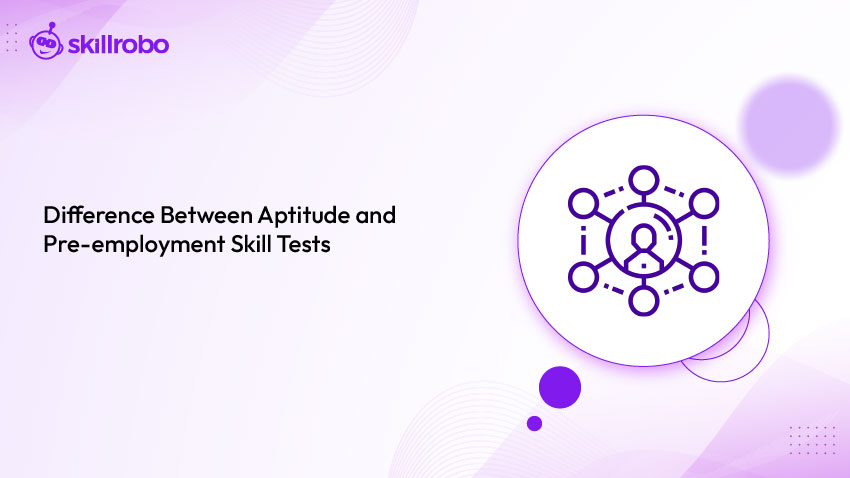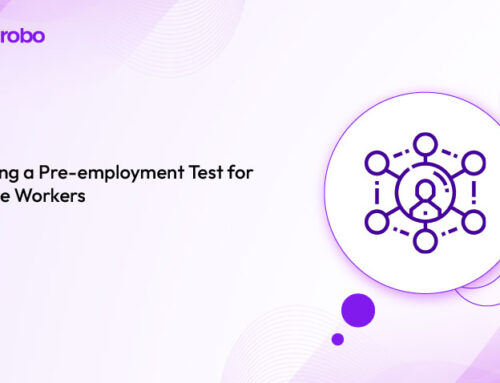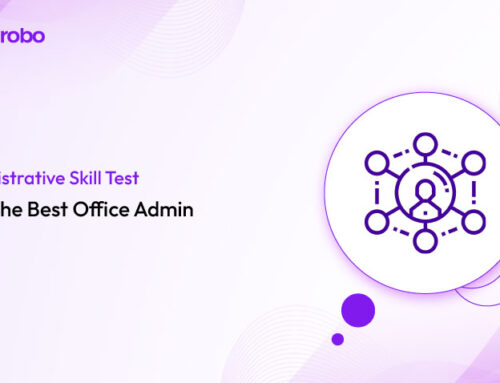
Key Takeaways
- Aptitude tests assess innate potential, like reasoning and problem-solving, unlike pre-employment skill tests, which evaluate specific, job-ready abilities tailored to roles.
- Skillrobo’s aptitude tests measure cognitive capacity and learning agility; its skill tests confirm technical expertise or role-specific proficiency for hiring needs.
- Aptitude tests predict long-term growth and adaptability potential, while skill tests ensure immediate job fit, aiding HR in making precise, informed decisions.
- Combining both offers a comprehensive, balanced view of candidates’ future potential and current capabilities, optimizing talent selection and workforce planning.
Choosing the Right Assessment for Smarter Hiring
Selecting the optimal assessment tool is vital for HR professionals, yet distinguishing between aptitude and pre-employment skill tests remains a challenge for many. A 2023 industry survey revealed that 60% of hiring managers misalign these tests with role requirements, risking poor hires and inefficiencies. Aptitude tests evaluate innate, natural abilities like problem-solving and critical thinking, while pre-employment skill tests measure concrete, job-specific competencies essential for immediate performance.
Misapplying them can miss hidden talent or onboard candidates unprepared for role demands. Understanding their distinct purposes empowers recruiters to tailor evaluations effectively, enhancing hiring precision.
In this blog, we’ll explore the differences between aptitude and pre-employment skill tests, their practical applications, and how Skillrobo optimizes both for smarter, data-driven hiring decisions.
Defining Aptitude and Skill Tests
Grasping what aptitude and pre-employment skill tests measure lays the groundwork for their effective use. Aptitude tests focus on inherent potential, such as logical reasoning or adaptability, while skill tests assess mastered proficiencies tied to specific roles, like coding or customer service.
A 2023 Assessment-Training article notes that 55% of HR teams struggle to differentiate these, impacting hiring precision. Companies like Google strategically apply both to evaluate candidates, showcasing their unique purposes.
Aptitude Test Basics
Aptitude tests measure cognitive strengths—like reasoning, verbal skills, and numerical ability—revealing innate potential for growth. Skillrobo’s assessments for cognitive abilities target these traits to predict future performance effectively.
Skill Test Basics
Skill tests verify practical expertise, such as software proficiency, typing speed, or technical know-how, ensuring candidates meet job-specific demands and excel immediately. These evaluations confirm readiness for role requirements with accuracy.
Key Distinctions
Aptitude tests predict learning potential and long-term growth trajectory over time; skill tests confirm current proficiency and immediate job fit. Understanding this split ensures hiring aligns with role needs efficiently
Purpose and Application
The purpose of aptitude and skill tests define how they fit into recruitment. Aptitude tests explore a candidate’s capacity to develop, ideal for roles with growth potential, while skill tests confirm immediate readiness for specialized tasks. A 2024 Toggl survey found 58% of recruiters value this dual-purpose approach for thorough evaluations. Skillrobo’s platform supports both, offering HR tailored solutions.
Aptitude Test Goals
Aptitude tests identify adaptability, problem-solving, and reasoning skills, making them ideal for future-focused roles with long-term potential. Skillrobo’s tools highlight growth capacity effectively, aiding HR in spotting talent with development promise.
Skill Test Goals
Skill tests confirm job-ready capabilities—like data analysis, technical expertise, or process execution—ensuring candidates meet immediate role demands. These competency evaluations verify practical fit and performance readiness with precision.
Application Contexts
Aptitude tests suit trainees or entry-level roles with learning curves; skill tests fit experts for specialized tasks. Applying them in the right context drives 50% better hires, per industry insights and trends.
When to Choose Each Test
Deciding between aptitude and skill tests hinges on timing and role requirements. Aptitude tests excel for candidates needing development, while skill tests are essential for roles demanding proven expertise. A 2023 PMapsTest report suggests 62% of HR teams adjust test type by job level for optimal outcomes. Skillrobo’s flexibility aids HR in making precise choices.
Aptitude for Development
Use aptitude tests for entry-level or evolving roles with significant growth potential over time. Skillrobo’s cognitive focus predicts long-term success by assessing adaptability, reasoning, and learning capacity effectively across diverse contexts.
Skills for Expertise
Apply skill tests for technical or immediate-impact positions requiring deep, specialized expertise and proficiency. These thorough assessments ensure readiness, precision, and alignment with role-specific demands, confirming instant job suitability accurately.
Blended Strategy
Combine both tests for a balanced, comprehensive insight into candidates’ potential and current proficiency levels. Toggl’s 2024 survey reports 25% higher hire quality with this dual approach, significantly enhancing recruitment outcomes and decisions.
Benefits of Each Approach
Aptitude and skill tests each offer distinct advantages, enhancing recruitment when used appropriately. Aptitude tests uncover future potential, while skill tests verify current performance, together minimizing hiring risks. A 2023 industry study found 59% of firms improve hire fit with targeted testing.
Aptitude Test Advantages
Aptitude tests reveal learning agility, versatility, and cognitive strengths like problem-solving and adaptability, identifying candidates poised for long-term growth and success. Skillrobo’s analytics spotlight high-potential talent efficiently, enabling HR to prioritize individuals with the capacity to evolve and excel in dynamic, future-focused roles over time.
Skill Test Advantages
Skill tests reduce onboarding time by confirming immediate expertise in areas like technical skills, software proficiency, or role-specific tasks, ensuring rapid productivity. A 2023 PMapsTest report notes 20% faster starts with a skill-focused approach, as these assessments validate practical readiness, minimizing training needs and accelerating impact in specialized positions.
Combined Impact
Pairing aptitude and skill tests boosts hiring accuracy by blending insights into potential and proven proficiency, creating a holistic candidate profile. This dual strategy enhances decision-making, reduces mismatches, and improves long-term retention. A 2023 study shows that firms using both see 25% better role fit, driving recruitment success effectively.
How Skillrobo Supports Both Tests
Skillrobo’s AI-driven platform seamlessly integrates aptitude and skill testing, providing HR with a versatile toolset for precise evaluations. Its features cater to both test types, ensuring alignment with job needs. A 2024 Assessment-Training insight praises such platforms for 60% more consistent hiring outcomes.
Aptitude Testing Tools
Skillrobo’s AI designs cognitive questions, assessing reasoning with real-time data for deep insights.
Skill Testing Tools
Role-specific tests—like coding or communication—verify expertise. Skillrobo’s communication assessments target practical skills.
Integrated Flexibility
One platform manages both, streamlining workflows. Skillrobo’s proctoring ensures fairness across assessments.
Overcoming Common Confusions
Misunderstandings about aptitude and skill tests can derail their effectiveness. Addressing these ensures HR applies them purposefully, with Skillrobo tackling typical challenges directly.
Aptitude vs. Experience
Aptitude isn’t a measure of prior skill or work history but innate potential for growth. Skillrobo’s assessments for cognitive abilities distinguish these clearly, ensuring accurate, unbiased evaluations for HR.
Skill Test Scope
Skill tests aren’t universal solutions but tailored to specific role demands and expertise levels. These assessments focus on job-critical skills, guiding HR to apply them precisely for relevant, effective outcomes.
Design Complexity
Tests needn’t be complex or daunting to design and implement for recruitment purposes. Simplified processes ensure ease, relevance, and accessibility, allowing HR to create impactful evaluations without added stress.
Over-Reliance Trap
Neither test fully replaces interviews or broader candidate reviews in hiring decisions. They enhance, not dictate, the process, complementing other methods to form a complete, balanced candidate assessment.
Conclusion
The difference between aptitude and pre-employment skill tests—potential versus proficiency—shapes effective hiring, and Skillrobo excels at both. With role-specific assessments, cognitive and behavioral evaluations, AI-based questions, and real-time analytics, it empowers HR to assess candidates holistically. This dual approach ensures hires fit today and grow tomorrow.
Ready to sharpen your hiring strategy? Sign up for Skillrobo today and leverage tailored testing to build a capable, future-ready team.









